i) Given a =( 5, d = 3, an = 50,find n and Sn.
Using formula an = a + (n-1)d, to find nth term of arithmetic progression,
⇒ 50 = 5 + (n − 1) (3)
⇒ 50 = 5 + 3n − 3
⇒ 48 = 3n⇒ n = 16
Applying formula, to find sum of n terms of AP,
to find sum of n terms of AP,
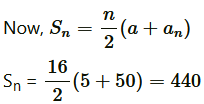
Therefore, n = 16 and Sn = 440
(ii) Given a = 7, a13 = 35, find d and S13..
Using formula an = a + (n-1)d, to find nth term of arithmetic progression,
an = a + (n-1)d
a13= 7 + (13 − 1) (d)
⇒ 35 = 7 + 12d
⇒ 28 = 12d⇒ d = 28/12 = 7/3
Applying formula, to find sum of n terms of AP,
to find sum of n terms of AP,
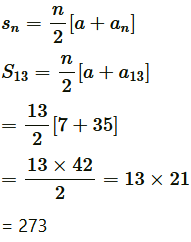
Therefore, d = 7/3 and S13 = 273
(iii) Given a12 = 37, d = 3, find a and S12..
Using formula an = a + (n-1)d, to find nth term of arithmetic progression,
an = a + (n-1)d
a12 = a + (12 − 1) 3
⇒ 37 = a + 33 ⇒ a = 4
Applying formula, to find sum of n terms of AP,
to find sum of n terms of AP,
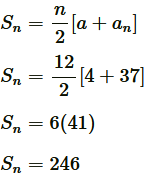
Therefore, a = 4 and S12 = 246
(iv) Given a3 = 15, S10 = 125, find d and a10..
Using formula an = a + (n-1)d, to find nth term of arithmetic progression,
an = a + (n-1)d
a3 = a + (3 − 1) (d)
⇒ 15 = a + 2d
⇒ a = 15 − 2d… (1)
Applying formula, to find sum of n terms of AP,
to find sum of n terms of AP,

⇒ 125 = 5 (2a + 9d) = 10a + 45d
Putting (1) in the above equation,
125 = 5 [2 (15 − 2d) + 9d] = 5 (30 − 4d + 9d)
⇒ 125 = 150 + 25d
⇒ 125 – 150 = 25d
⇒ −25 = 25d⇒ d = −1
Using formula an = a + (n-1)d, to find nth term of arithmetic progression,
an = a + (n-1)d
a10= a + (10 − 1) d
Putting value of d and equation (1) in the above equation,
a10= 15 − 2d + 9d = 15 + 7d
= 15 + 7 (−1) = 15 – 7 = 8
Therefore, d = −1 and a10= 8
(v) Given d = 5,S9 = 75, find a and a9..
Applying formula, to find sum of n terms of AP,
to find sum of n terms of AP,
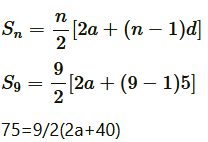
⇒ 150 = 18a + 360
⇒ −210 = 18a
⇒ a = 
Using formula an = a + (n-1)d, to find nth term of arithmetic progression,
a9 =  + (9 − 1) (5)
+ (9 − 1) (5)
a9 =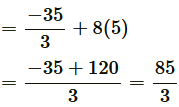
Therefore, a =  and a9 =
and a9 = 
(vi) Given a = 2, d = 8, Sn = 90, find n and an.
Applying formula, to find sum of n terms of AP,
to find sum of n terms of AP,
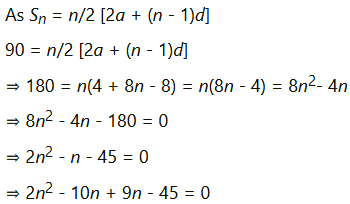
⇒ 2n (n − 5) + 9 (n − 5) = 0
⇒ (n − 5) (2n + 9) = 0
⇒ n = 5,−9/2
We discard the negative value of n because here n cannot be in negative or fraction.
The value of n must be a positive integer.
Therefore, n = 5
Using formula an = a + (n-1)d ,to find nth term of arithmetic progression,
a5 = 2 + (5 − 1) (8) = 2 + 32 = 34
Therefore, n = 5 and a5 = 34
(vii) Given a = 8, an = 62, Sn = 210, find n and d.
Using formula an = a + (n-1)d, to find nth term of arithmetic progression,
62 = 8 + (n − 1) (d) = 8 + nd – d
⇒ 62 = 8 + nd − d
⇒ nd – d = 54
⇒ nd = 54 + d… (1)
Applying formula, to find sum of n terms of AP,
to find sum of n terms of AP,
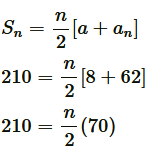
⇒ n = 6
Putting value of n in equation (1),
6d = 54 + d ⇒ d = 
Therefore, n = 6 and d =
(viii) Given Given an = 4, d = 2, Sn = − 14, find n and a
Using formula an = a + (n-1)d , to find nth term of arithmetic progression,
4 = a + (n − 1) (2) = a + 2n − 2
⇒ 4 = a + 2n – 2
⇒ 6 = a + 2n
⇒ a = 6 − 2n… (1)
Applying formula, to find sum of n terms of AP,
to find sum of n terms of AP,
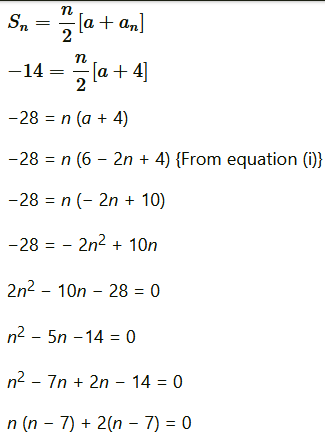
⇒ (n + 2) (n − 7) = 0
⇒ n = −2, 7
Here, we cannot have a negative value of n.
Therefore, we discard the negative value of n which means n = 7.
Putting value of n in equation (1), we get
a = 6 − 2n = 6 – 2 (7) = 6 – 14 = −8
Therefore, n = 7 and a = −8
(ix)Given a = 3, n = 8, S = 192, find d.
Using formula, an = a + (n-1)d to find sum of n terms of AP, we get
192 =  [6 + (8 − 1) d] = 4 (6 + 7d)
[6 + (8 − 1) d] = 4 (6 + 7d)
⇒ 192 = 24 + 28d
⇒ 168 = 28d ⇒ d = 6
(x) Given l = 28, S = 144, and there are total of 9 terms. Find a.
Applying formula,  , to find sum of n terms, we get
, to find sum of n terms, we get
144 =  [a + 28]
[a + 28]
⇒ 288 = 9 [a + 28]
⇒ 32 = a + 28⇒ a = 4











